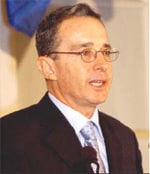Colombia
 |
|
Uribe: Washington’s |
rate, Uribe won by a comfortable margin, garnering 62% of the votes, making him the first sitting president to be reelected in Colombian history. Carlos Gaviria, a former judge who was Uribe’s left-wing contender, gained only 22% of votes.Analysts regard the reelection as a vote of confidence in the president’s conservative economic policies and hard-line stance against Marxist rebels, right-wing paramilitary fighters and narcoterrorists.
So far, Uribe’s policies have paid off. Since his first election in 2002, foreign investment has risen by 97%. Monthly inflation slowed to 0.33% in May, the lowest level since 1986, bringing annualized inflation to 2.71% (versus 3.51% during the first five months of 2005). In June the government revised its 2006 budget gap forecast to 1.5% of GDP from a previous 2% as a result of higher oil prices.
Having lost its investmentgrade rating in 1999, Colombia may be on the road to recovering the rating under Uribe’s stewardship.“If the government successfully moves on its economic policy agenda, the sovereign ratings—which currently have a positive outlook—could be upgraded,” says Standard & Poor’s credit analyst Richard
Francis sees streamlining and expanding the tax base, reforming the pension system and overhauling the system of transfers to local governments as crucial reforms. Colombia’s foreign currency sovereign debt is rated BB by
Standard & Poor’s, just two notches below investment grade.
Critics contend Uribe’s second term must focus on reducing poverty levels. If not, they charge, it won’t be long before Colombia steps to the left. Uribe and his supporters are not concerned. Uribe does not rule out the possibility of seeking a third term in 2010.
Antonio Guerrero



